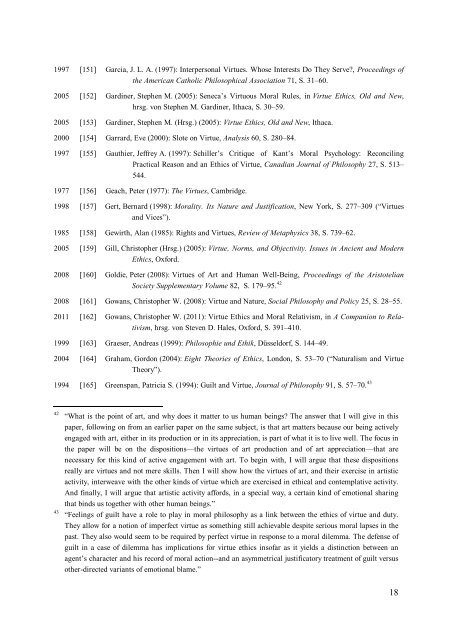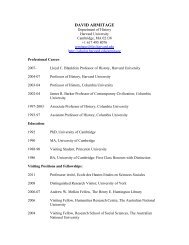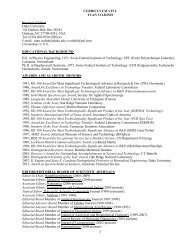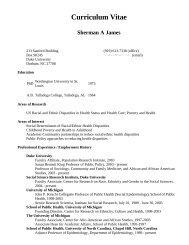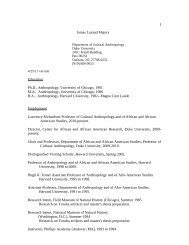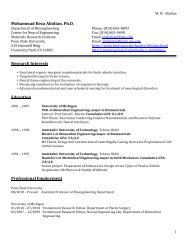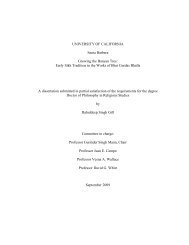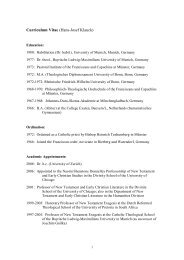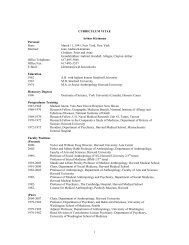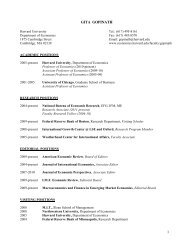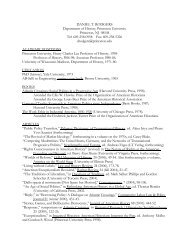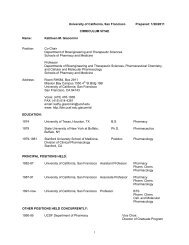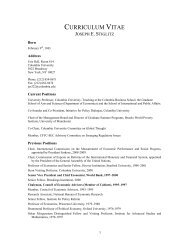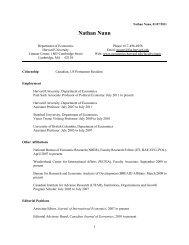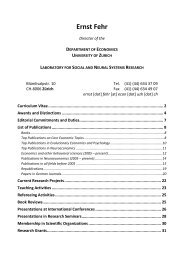1997 [151] Garcia, J. L. A. (1997): Interpers<strong>on</strong>al <strong>Virtue</strong>s. Whose Interests Do They Serve?, Proceedings ofthe American Catholic Philosophical Associati<strong>on</strong> 71, S. 31–60.2005 [152] Gardiner, Stephen M. (2005): Seneca’s Virtuous Moral Rules, in <strong>Virtue</strong> Ethics, Old and New,hrsg. v<strong>on</strong> Stephen M. Gardiner, Ithaca, S. 30–59.2005 [153] Gardiner, Stephen M. (Hrsg.) (2005): <strong>Virtue</strong> Ethics, Old and New, Ithaca.2000 [154] Garrard, Eve (2000): Slote <strong>on</strong> <strong>Virtue</strong>, Analysis 60, S. 280–84.1997 [155] Gauthier, Jeffrey A. (1997): Schiller’s Critique of Kant’s Moral Psychology: Rec<strong>on</strong>cilingPractical Reas<strong>on</strong> and an Ethics of <strong>Virtue</strong>, Canadian Journal of Philosophy 27, S. 513–544.1977 [156] Geach, Peter (1977): The <strong>Virtue</strong>s, Cambridge.1998 [157] Gert, Bernard (1998): Morality. Its Nature and Justificati<strong>on</strong>, New York, S. 277–309 (“<strong>Virtue</strong>sand Vices”).1985 [158] Gewirth, Alan (1985): Rights and <strong>Virtue</strong>s, Review of Metaphysics 38, S. 739–62.2005 [159] Gill, Christopher (Hrsg.) (2005): <strong>Virtue</strong>, Norms, and Objectivity. Issues in Ancient and ModernEthics, Oxford.2008 [160] Goldie, Peter (2008): <strong>Virtue</strong>s of Art and Human Well-Being, Proceedings of the AristotelianSociety Supplementary Volume 82, S. 179–95. 422008 [161] Gowans, Christopher W. (2008): <strong>Virtue</strong> and Nature, Social Philosophy and Policy 25, S. 28–55.2011 [162] Gowans, Christopher W. (2011): <strong>Virtue</strong> Ethics and Moral Relativism, in A Compani<strong>on</strong> to Relativism,hrsg. v<strong>on</strong> Steven D. Hales, Oxford, S. 391–410.1999 [163] Graeser, Andreas (1999): Philosophie und Ethik, Düsseldorf, S. 144–49.2004 [164] Graham, Gord<strong>on</strong> (2004): Eight Theories of Ethics, L<strong>on</strong>d<strong>on</strong>, S. 53–70 (“Naturalism and <strong>Virtue</strong>Theory”).1994 [165] Greenspan, Patricia S. (1994): Guilt and <strong>Virtue</strong>, Journal of Philosophy 91, S. 57–70. 434243“What is the point of art, and why does it matter to us human beings? The answer that I will give in thispaper, following <strong>on</strong> from an earlier paper <strong>on</strong> the same subject, is that art matters because our being activelyengaged with art, either in its producti<strong>on</strong> or in its appreciati<strong>on</strong>, is part of what it is to live well. The focus inthe paper will be <strong>on</strong> the dispositi<strong>on</strong>s—the virtues of art producti<strong>on</strong> and of art appreciati<strong>on</strong>—that arenecessary for this kind of active engagement with art. To begin with, I will argue that these dispositi<strong>on</strong>sreally are virtues and not mere skills. Then I will show how the virtues of art, and their exercise in artisticactivity, interweave with the other kinds of virtue which are exercised in ethical and c<strong>on</strong>templative activity.And finally, I will argue that artistic activity affords, in a special way, a certain kind of emoti<strong>on</strong>al sharingthat binds us together with other human beings.”“Feelings of guilt have a role to play in moral philosophy as a link between the ethics of virtue and duty.They allow for a noti<strong>on</strong> of imperfect virtue as something still achievable despite serious moral lapses in thepast. They also would seem to be required by perfect virtue in resp<strong>on</strong>se to a moral dilemma. The defense ofguilt in a case of dilemma has implicati<strong>on</strong>s for virtue ethics insofar as it yields a distincti<strong>on</strong> between anagent’s character and his record of moral acti<strong>on</strong>--and an asymmetrical justificatory treatment of guilt versusother-directed variants of emoti<strong>on</strong>al blame.”18
1996 [166] Griffin, James (1996): Value Judgement. Improving Our Ethical Beliefs, Oxford, S. 112–16(“<strong>Virtue</strong> Ethics”).1998 [167] Griffin, James (1998): <strong>Virtue</strong> Ethics and Envir<strong>on</strong>s, in <strong>Virtue</strong> and Vice, hrsg. v<strong>on</strong> Ellen FrankelPaul, Fred D. Miller, Jr. und Jeffrey Paul, Cambridge, S. 56–70.2007 [168] Hacker-Wright, John (2007): Moral Status in <strong>Virtue</strong> Ethics, Philosophy 82, S. 449–73. 442010 [169] Hacker-Wright, John (2010): <strong>Virtue</strong> Ethics without Right Acti<strong>on</strong>: Anscombe, Foot, and C<strong>on</strong>temporary<strong>Virtue</strong> Ethics, Journal of Value Inquiry 44, S. 209–24.2005 [170] Hanafin, John/Coady, C. A. (Hrsg.) (2005): Unity, Separateness and C<strong>on</strong>flict in the <strong>Virtue</strong>s,Aldershot.1999 [171] Harman, Gilbert (1999): Moral Philosophy Meets Social Psychology. <strong>Virtue</strong> Ethics and theFundamental Attributi<strong>on</strong> Error, Proceedings of the Aristotelian Society 99, S. 315–31.Wiederabgedruckt in Harman, Explaining Value and Other Essays in MoralPhilosophy, Oxford 2000, S. 165–78. – Vgl. dazu [23], [243], [399].2000 [172] Harman, Gilbert (2000): The N<strong>on</strong>existence of Character Traits, Proceedings of the AristotelianSociety 100, S. 223–26. – Zu [23].2003 [173] Harman, Gilbert (2003): No Character or Pers<strong>on</strong>ality, Business Ethics Quarterly 13, S. 87–94. –Zu [395].2009 [174] Harman, Gilbert (2009): Skepticism about Character Traits, Journal of Ethics 13, S. 235–42. 452005 [175] Harris, George W. (2005): The <strong>Virtue</strong>s, Perfecti<strong>on</strong>ist Goods, and Pessimism, in <strong>Virtue</strong> Ethics,Old and New, hrsg. v<strong>on</strong> Stephen M. Gardiner, Ithaca, S. 193–210.1995 [176] Harris<strong>on</strong>, J<strong>on</strong>athan (1995): Is <strong>Virtue</strong> in the Interest of the Str<strong>on</strong>ger? or the Prevaricati<strong>on</strong>s ofPlato, in ders., Ethical Essays Vol. III: New Essays, Aldershot, S. 220–44.4445(http://romulus.umd.edu/ARHU/Depts/Philosophy/Faculty/PGreenspan/Res/g&vabs.html)“My c<strong>on</strong>tenti<strong>on</strong> is that virtue ethics offers an important critique of traditi<strong>on</strong>al philosophical c<strong>on</strong>cepti<strong>on</strong>s ofmoral status as well as an alternative view of important moral issues held to depend <strong>on</strong> moral status. I arguethat the scope of entities that deserve c<strong>on</strong>siderati<strong>on</strong> depends <strong>on</strong> our c<strong>on</strong>cepti<strong>on</strong> of the demands of virtueslike justice; which entities deserve c<strong>on</strong>siderati<strong>on</strong> emerges from a moral view of a world shaped by thatc<strong>on</strong>cepti<strong>on</strong>. The deepest disputes about moral status depend <strong>on</strong> c<strong>on</strong>flicting c<strong>on</strong>cepti<strong>on</strong>s of justice. I advocatea c<strong>on</strong>cepti<strong>on</strong> of the virtue of justice that can account for the cases that pose problems for the legalistic viewsof moral status and discuss what ideal moral debate looks like <strong>on</strong> this view.”“The first part of this article discusses recent skepticism about character traits. The sec<strong>on</strong>d describes variousforms of virtue ethics as reacti<strong>on</strong>s to such skepticism. The philosopher J.-P. Sartre argued in the 1940s thatcharacter traits are pretenses, a view that the sociologist E. Goffman elaborated in the 1950s. Since thensocial psychologists have shown that attributi<strong>on</strong>s of character traits tend to be inaccurate through theignoring of situati<strong>on</strong>al factors. (Pers<strong>on</strong>ality psychology has tended to c<strong>on</strong>centrate <strong>on</strong> people’s c<strong>on</strong>cepti<strong>on</strong>s ofpers<strong>on</strong>ality and character rather than <strong>on</strong> the accuracy of these c<strong>on</strong>cepti<strong>on</strong>s). Similarly, the political theoristR. Hardin has argued for situati<strong>on</strong>al explanati<strong>on</strong>s of bloody social disputes in the former Yugoslavia and inAfrica, rather than explanati<strong>on</strong>s in terms of ethnic hatred for example. A versi<strong>on</strong> of virtue ethics mightidentify virtues as characteristics of acts rather than character traits, as traits c<strong>on</strong>sisting in actual regularitiesin behavior, or as robust dispositi<strong>on</strong>s that would manifest themselves also in counterfactual situati<strong>on</strong>s.”19
- Page 1: Literatur
- Page 4 and 5: national Journal of Management Revi
- Page 6: 53.2010 [39] Battaly, Heather (2010
- Page 9 and 10: 2005 [60] Brady, Michael S. (2005):
- Page 11 and 12: 2008 [72] Calhoun, Cheshire (2008):
- Page 13 and 14: 1998 [93] Cooper, John M. (1998): T
- Page 15 and 16: 2005 [120] Doris, John M. (2005): R
- Page 17: 1978 [138] Foot, Philippa (1978): V
- Page 21 and 22: 166-84.1996 [188] Hooker, Brad (199
- Page 23 and 24: Theory and Moral Practice 8, S. 387
- Page 25 and 26: Ethics, hrsg. von Patricia H. Werha
- Page 27 and 28: Deutsche Zeitschrift für Philosoph
- Page 29 and 30: 2009 [280] Miller, Christian (2009)
- Page 31 and 32: 2000 [299] Oderberg, David S. (2000
- Page 33 and 34: Moral Education 24, S. 175-184.1997
- Page 35 and 36: Southern Journal of Philosophy 14,
- Page 37 and 38: 1997 [379] Slote, Michael (1997): V
- Page 39 and 40: 2009 [401] Sreenivasan, Gopal (2009
- Page 41 and 42: 2010 [416] Stohr, Karen E. (2010):
- Page 43 and 44: 2008 [441] Tessman, Lisa (2008): Re
- Page 45 and 46: 2009 [457] van Zyl, Liezl (2009): A
- Page 47 and 48: 2006 [475] Webber, Jonathan (2006):
- Page 49 and 50: 2008 [484] White, Richard (2008): R


